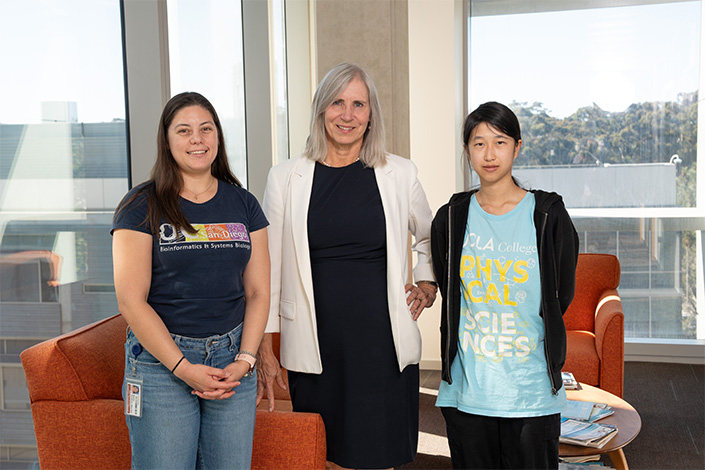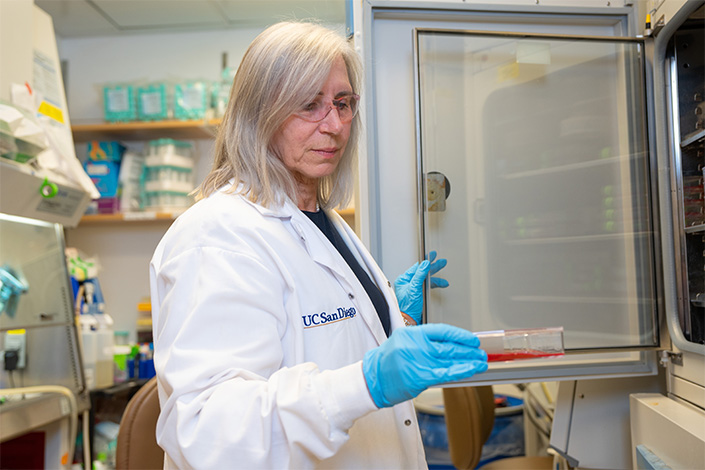A New Approach to Predicting Malaria Drug Resistance
Study of malaria parasite genomes paves the way for new, more effective treatments
Story by:
Published Date
Article Content
Researchers at University of California San Diego analyzed the genomes of hundreds of malaria parasites to determine which genetic variants are most likely to confer drug resistance. The findings, published in Science, could help scientists use machine learning to predict antimalarial drug resistance and more effectively prioritize the most promising experimental treatments for further development. The approach could also help predict treatment resistance in other infectious diseases, and even cancer.
“A lot of drug resistance research can only look at one chemical agent at a time, but what we’ve been able to do here is create a roadmap for understanding antimalaria drug resistance across more than a hundred different compounds,” said Elizabeth Winzeler, Ph.D., a professor at UC San Diego Skaggs School of Pharmacy and Pharmaceutical Sciences and the Department of Pediatrics at UC San Diego School of Medicine. “These results will be useful for other diseases as well, because many of the resistant genes we studied are conserved across different species.”
Malaria, a mosquito-borne disease that affects hundreds of millions of people worldwide, is a major public health threat in many tropical and subtropical regions. Despite considerable progress toward controlling the disease, malaria remains a leading cause of morbidity and mortality, particularly in Africa, where 95% of malaria deaths occur according to the World Health Organization. First-line drugs have repeatedly failed due to the spread of drug-resistant strains of Plasmodium falciparum, the parasite that causes malaria.
“The need for new, more effective malaria treatments is urgent, but funding for malaria research and drug development is very limited,” said Winzeler, who in addition to her role at UC San Diego is director of the Bill and Melinda Gates Foundation-funded Malaria Drug Accelerator. “However, the malaria research community is organized and highly collaborative, and our study was able to leverage these strengths to create a resource that will make the process of identifying and prioritizing new malaria treatments significantly easier.”
The researchers analyzed the genomes of 724 malaria parasites evolved in the lab to resist one of 118 different antimalarial compounds, including both established treatments and new experimental agents. By looking for patterns in the mutations that were associated with resistance, the researchers were able to identify unique features of these genetic variants, such as their physical location within genes, that could be used to predict which variations are likely to contribute to drug resistance.
“Our ultimate goal is to use machine learning to help us understand which compounds have the most risk of being compromised by resistance so that we can streamline the early drug development process and ultimately get treatments into clinical trials faster,” said Winzeler. “This study gives us the data needed to train these new tools.”
"The potential impact of this study is huge and extends well beyond a single disease. Studying malaria gave us the opportunity to put this resource together, and we hope that these findings will help change the way we study drug resistance as a whole, not just in malaria.”
“The study also uncovers how networks of genes come together to mediate resistance across chemical classes, and provides a road map as we search for resistance-refractory compounds,” adds David Fidock, Ph.D., coauthor and a professor of microbiology and immunology at Columbia University Vagelos College of Physicians and Surgeons.
While the findings have significant implications for the development of new antimalarial drugs, the researchers also highlight that their approach could be relevant across different diseases. This is because the genetic machinery driving drug resistance is consistent across different pathogens and even within human cells. For example, many of the resistance-driving mutations identified in the study were from a protein in P. falciparum parasites, called PfMDR1, that can move substances between various parts of the cell, including transporting drugs away from their site of action. PfMDR1 has an exact counterpart in humans, and mutations in the human version are one of the key drivers of treatment resistance in cancer.
"The potential impact of this study is huge and extends well beyond a single disease,” said Winzeler. "Studying malaria gave us the opportunity to put this resource together, and we hope that these findings will help change the way we study drug resistance as a whole, not just in malaria.”
Read the full study.

This photo shows co-first authors Karla P. Godinez-Macias (left), Daisy Chen (right), and senior author Elizabeth Winzeler (center).
Coauthors on the study include Madeline R. Luth, Karla P. Godinez-Macias, Daisy Chen, Sindhu Daggupati, Jan M. Economy, Juan Carlos Jado, Gregory M. LaMonte, Ashley You, Jair Lage De Siqueira-Neto, Sabine Ottilie and Frances Rocamora at University of California San Diego; John Okombo, Vandana Thathy, Satish K. Dhingra, Sunil K. Narwal, Tolla Ndiaye, Sachel Mok, Tomas Yeo, Heekuk Park, Anne-Catrin Uhlemann, Manu Vanaerschot, and David A. Fidock at Columbia University Irving Medical Center; Xiu Cheng, Tomoyo Sakata-Kato and Nobutaka Kato at Global Health Drug Discovery Institute; Heledd Davies, Rebecca C. S. Edgar and Marcus C.S. Lee at Wellcome Sanger Institute and the University of Dundee; Maria G. Gomez-Lorenzo, Sara Palomo Diaz and Francisco-Javier Gamo at GSK; Eva S. Istvan and Daniel E. Goldberg at Washington University School of Medicine; Bruno Melillo, Guoqin Xia and Case W. McNamara at Scripps Research; Stella Peña, Gloria Serra at Universidad de la República; Robert L. Summers, Amanda K. Lukens, and Dyann F. Wirth at Harvard T.H. Chan School of Public Health; Patrick K. Tumwebaze at Infectious Diseases Research Collaboration; Daouda Ndiaye at Centre International de Recherche et de Formation en Génomique Appliquée et de Surveillance Sanitaire; Philip J. Rosenthal at University of California San Francisco; Stuart L. Schreiber at Broad Institute of MIT and Harvard; and Tina S. Skinner-Adams at Griffith University.
The study was funded, in part, by the Bill and Melinda Gates Foundation (grant OPP1054480), the National Institute for General Medical Sciences (grant T32 GM008666), and the National Institutes of Health.
Disclosures: The authors declare no competing interests.

Share This:
Stay in the Know
Keep up with all the latest from UC San Diego. Subscribe to the newsletter today.




